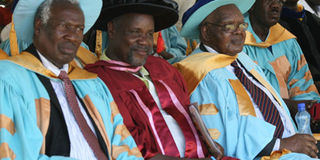Why this country needs professors

Professors Bethwell Ogot (right) and his counterparts at the burial of Professor William Ochieng' in Urima village, Siaya County on January 10, 2014. Kenyans hold professors in contempt, ridiculing their career choices and their inability to make money despite their string of degrees. PHOTO | FILE | NATION MEDIA GROUP
What you need to know:
Our failure to envision a great nation is clearly impeding our appreciation of the role academics can play in realising it.
If we so task them, we shall start to see professors as vital means to a desirable end – and resource them accordingly.
The developed world figured out this a long time ago: There is a correlation between development and facilitation for the professoriate.
Professors are not the most lovable creatures that you ever saw. In fact, I wouldn’t suggest that you hug one.
Most have the sartorial tastes of bohemians. Some demand hollow respect, insisting on being called “Doctor” or “Professor.”
Forgive them, for insistence on status is often the last refuge of a tormented lot.
Beyond romanticising the professoriate, for which I am guilty as charged, what is the importance of this cadre in a country like ours?
FINANCIAL WISDOM
We hold professors in contempt, ridiculing their career choices and their inability to make money despite their string of degrees.
In a heated WhatsApp discussion about the role of professors, someone forwarded a long advisory teeming with financial wisdom from the likes of Jack Ma and Robert Kiyosaki.
Jack Ma was quoted as having stated: “If you put bananas and money in front of monkeys, monkeys will choose bananas because monkeys do not know that money can buy a lot of bananas.”
Bananas represent business, where real money is to be made. I won’t say the monkeys represent professors who “foolishly” chose jobs over business, but you get the drift.
The subtext in this money-centric wisdom is this: Professors should use their heads for once, go into business and make lots of money.
PRODUCE ARTISANS
How we got here is a lesson in national self-delusion, the creeping notion that we can do without professors.
During colonialism, education was meant to produce artisans for the efficient extraction of raw materials for the imperial industries.
For 50 years of the 70 years of colonial rule, Africans could only access a four-year basic education. Few Africans went beyond this level.
The Royal Technical College, now the University of Nairobi, was established in 1956.
Enter independence in 1963. The notions of higher education held by the founding fathers were polemical to the condescending “civilising mission” colonial education and an aspiration for economic freedom.
Pragmatists to the core, their dream for higher education had a mainly utilitarian orientation, livened by disinterested scholarship and research.
NATION-BUILDING
In Sessional Paper number 10 of 1965 titled African Socialism and Its Application to Planning in Kenya, the founders recognised training of skilled manpower as a pivotal pillar of development.
Higher education was seen as the pathway to not only the preservation and utilisation of the environment for productive gain and sustainable livelihoods, but also for the production of quality human resources essential for industrial development and nation-building.
At a commencement ceremony in Makerere University College in 1965, Jomo Kenyatta, observed that a university “can offer and inspire: the bounty of knowledge, the zest of research, the faculty of judgment, the gift of humility” in order to build “a society that is vigorous by nature, strong in faith, and eternal in the arts of peace.”
POST-COLONIAL
In pursuit of such ideals, the government dedicated a large portion of its budget to education, including financing of scholarships for Kenyans to pursue advanced graduate studies abroad.
As is clear from the numerous biographies of the first generation of postcolonial professors, the government didn’t treat lecturers like free-reign chicken. None was goaded into business. They were well looked after. And they delivered big time.
The result is that today, compared to most other African countries, Kenya boasts of a considerable reservoir of highly trained and skilled manpower.
Our scientists recently sent a satellite into the orbit, doctors separated Siamese twins and re-attached severed limbs, and our lawyers have argued cases in international courts, provoking immense national pride.
BILLION HEISTS
Our engineers can dig long, complicated underground tunnels with pinpoint accuracy into bank-strong rooms. Even our technocrats and politicians perpetrate multi-billion heists against us without getting caught or paying taxes. As Daniel arap Moi used to say, ata hiyo ni maendeleo!
Unfortunately, this success has become our bane. We have utterly failed to craft a new ideal for our top brains and to provide them with the resources they need to attain it for us.
This inability to birth a new ideal for our academy speaks to our diminishing ambitions as a nation. Perhaps individual success for a few of us has deluded us into believing that we have arrived when the journey has not even began.
We need bigger dreams. We must set national goals for our scientists, engineers and technologists to turn this country into an industrial nation.
RELATIONAL IDIOM
Likewise, we must task our social scientists with coming up with the most ideal policies and operational aspects for our nation, and the humanities and arts specialists with imagining and inspiring a new communicative and relational idiom necessary for social and political stability.
Our failure to envision a great nation is clearly impeding our appreciation of the role academics can play in realising it.
If we so task them, we shall start to see professors as vital means to a desirable end – and resource them accordingly.
The developed world figured out this a long time ago: There is a correlation between development and facilitation for the professoriate.
The author teaches at the School of Journalism and Mass Communication, University of Nairobi.




